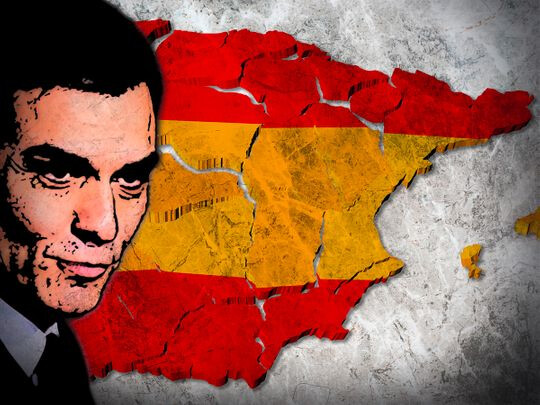Spain’s Partido Popular said it would “pay special attention” to cross-border movement between Gibraltar and Spain as part of a policy to “tackle the situation” created by Brexit.
The PP sketched out is stance on Gibraltar in its electoral manifesto published on Tuesday, in which it also said it would seek to “resume a responsible dialogue” with the UK on sovereignty in line with UN doctrine.
The party was the first to publish its manifesto ahead of the July 23 snap general election called by Spain’s Socialist Prime Minister, Pedro Sanchez.
While the PP has traditionally adopted a tougher stance on Gibraltar than the Socialists, it has also demonstrated pragmatism in the past.
The discussions about Gibraltar’s post-Brexit future after the 2016 referendum, for example, started under the PP when Mariano Rajoy was in office and Alfonso Dastis was the Foreign Minister.
But the PP is unlikely to secure enough votes to govern alone, with polls pointing to the possibility of a pact with the far-right party Vox.
That could potentially add another layer of difficulty and complexity given Vox’s hardline views on Gibraltar.
The manifesto was published as Chief Minister Fabian Picardo flew to London to update the European Scrutiny Committee in the House of Commons on the latest developments in respect of discussions for a UK/EU treaty on Gibraltar’s post-Brexit relations with the bloc.
Negotiators have held 13 formal rounds of talks but a deal still remains elusive despite consistent message of optimism.
No progress is expected until after the Spanish election, with the prospect of a swift resumption of the discussions dependent on the outcome of that vote and subsequent negotiations to form government.
The PP manifesto was scant on detail in respect of Gibraltar but reflected Spain’s longstanding position – on both sides of the political spectrum – of a desire to re-engage with the UK on sovereignty talks.
It is a position tabled every year at the UN and rebutted by both the UK and Gibraltar, who say only the Gibraltarians have the right to determine their own future.
“We will resume a responsible dialogue with the British government to address the process of decolonisation of Gibraltar and the recovery of sovereignty, in accordance with the doctrine established by the United Nations,” the PP manifesto said.
And with an eye on Brexit, it added: “We will tackle the situation that has arisen after Brexit, defending Spanish interests in fiscal, financial, environmental, and security matters, and we will pay special attention to the movement of people.”
Gibraltar was also mentioned in another section of the manifesto dealing with the PP’s aspirations, if elected, to take a more prominent international role.
The section singled out the need for “a deep and solid neighbourly relationship with Morocco and Algeria”, and for Spain to “fulfill its historical responsibilities and adopt a Mediterranean policy that addresses the problems of Europe's southern border”.
The PP also singled out the need to support Ukraine “because it is where the future of European democracy and freedoms for all is being decided”.
It also wants Spain to have “an active presence…according to our capabilities” with countries around the globe, especially those with which it has historical ties.
And it had this to add on Gibraltar: “Gibraltar remains a longstanding dispute that needs to be comprehensively addressed, taking into account all elements and circumstances.”
The PP’s manifesto also included a brief reference the Campo de Gibraltar in a section on security issues, and a commitment to declare the Campo de Gibraltar a special area f significance, something long clamoured for in the region.
“We will implement specific plans to reinforce police presence and address the circumstances of areas that deserve particular attention, such as entertainment zones and high-crime areas in cities,” the document said.
“We will strengthen the police response through the use of video surveillance and the latest techniques in intelligent patrolling.”
“Additionally, we will enhance security in depopulated areas at risk of demographic challenges.”
“We will analyse the possibility of declaring areas of special significance, such as the Campo de Gibraltar.”
In another development, The Times on Tuesday published a leader column headlined ‘Rocky diplomacy’, in which it highlighted the challenges facing Gibraltar as a result of Brexit and ahead of the Spanish election.
It said a PP/Vox government in Spain after July 23 could lead to “a hard border and an existential crisis”.
“Gibraltar occupies an awkward limbo, its only land border being with a country that is unhappy with its status,” The Times said.
“The way forward is through non-dogmatic compromise.”
“First, the [Spanish] election has not yet happened. It could be that a government can be found without the participation of Vox.”
“There is perhaps over-optimistic talk of a grand centrist coalition.”
“Second, both Spain and Britain are members of the Nato alliance and the naval port of Gibraltar remains a strategic chokepoint between the Atlantic and the Mediterranean.”
“At a time of war in Europe, Nato solidarity is an essential part of the security order. This is not the place or time to score nationalist points.”
“Spain has just taken over the six-month rotating presidency of the EU.”
“It is the perfect moment to be creative about resolving historical animosities.”
